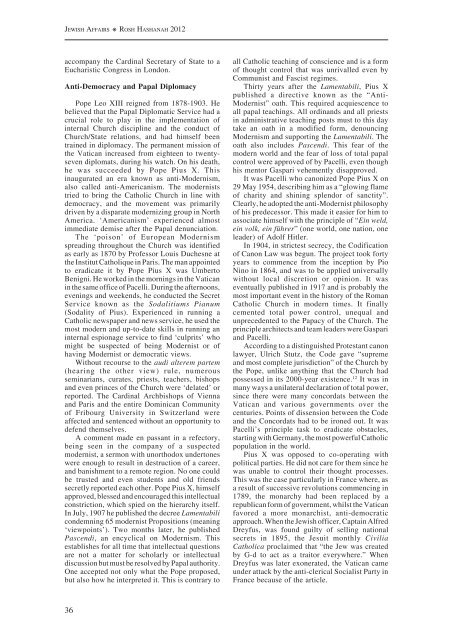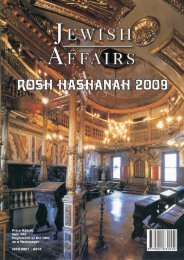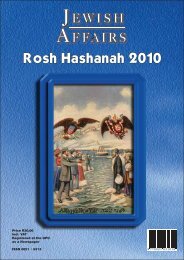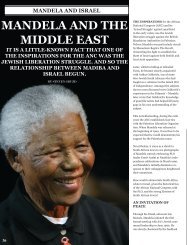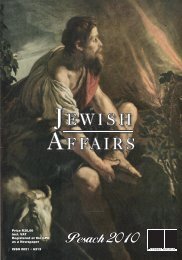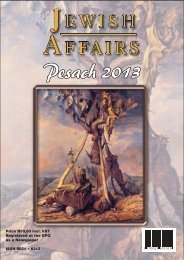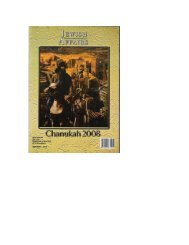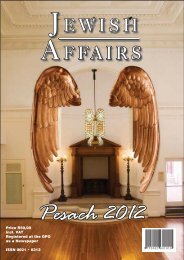Jewish Affairs - South African Jewish Board of Deputies
Jewish Affairs - South African Jewish Board of Deputies
Jewish Affairs - South African Jewish Board of Deputies
- No tags were found...
You also want an ePaper? Increase the reach of your titles
YUMPU automatically turns print PDFs into web optimized ePapers that Google loves.
JEWISH AFFAIRS ROSH HASHANAH 2012accompany the Cardinal Secretary <strong>of</strong> State to aEucharistic Congress in London.Anti-Democracy and Papal DiplomacyPope Leo XIII reigned from 1878-1903. Hebelieved that the Papal Diplomatic Service had acrucial role to play in the implementation <strong>of</strong>internal Church discipline and the conduct <strong>of</strong>Church/State relations, and had himself beentrained in diplomacy. The permanent mission <strong>of</strong>the Vatican increased from eighteen to twentysevendiplomats, during his watch. On his death,he was succeeded by Pope Pius X. Thisinaugurated an era known as anti-Modernism,also called anti-Americanism. The moderniststried to bring the Catholic Church in line withdemocracy, and the movement was primarilydriven by a disparate modernizing group in NorthAmerica. ‘Americanism’ experienced almostimmediate demise after the Papal denunciation.The ‘poison’ <strong>of</strong> European Modernismspreading throughout the Church was identifiedas early as 1870 by Pr<strong>of</strong>essor Louis Duchesne atthe Institut Catholique in Paris. The man appointedto eradicate it by Pope Pius X was UmbertoBenigni. He worked in the mornings in the Vaticanin the same <strong>of</strong>fice <strong>of</strong> Pacelli. During the afternoons,evenings and weekends, he conducted the SecretService known as the Sodalitiums Pianum(Sodality <strong>of</strong> Pius). Experienced in running aCatholic newspaper and news service, he used themost modern and up-to-date skills in running aninternal espionage service to find ‘culprits’ whomight be suspected <strong>of</strong> being Modernist or <strong>of</strong>having Modernist or democratic views.Without recourse to the audi alterem partem(hearing the other view) rule, numerousseminarians, curates, priests, teachers, bishopsand even princes <strong>of</strong> the Church were ‘delated’ orreported. The Cardinal Archbishops <strong>of</strong> Viennaand Paris and the entire Dominican Community<strong>of</strong> Fribourg University in Switzerland wereaffected and sentenced without an opportunity todefend themselves.A comment made en passant in a refectory,being seen in the company <strong>of</strong> a suspectedmodernist, a sermon with unorthodox undertoneswere enough to result in destruction <strong>of</strong> a career,and banishment to a remote region. No one couldbe trusted and even students and old friendssecretly reported each other. Pope Pius X, himselfapproved, blessed and encouraged this intellectualconstriction, which spied on the hierarchy itself.In July, 1907 he published the decree Lamentabilicondemning 65 modernist Propositions (meaning‘viewpoints’). Two months later, he publishedPascendi, an encyclical on Modernism. Thisestablishes for all time that intellectual questionsare not a matter for scholarly or intellectualdiscussion but must be resolved by Papal authority.One accepted not only what the Pope proposed,but also how he interpreted it. This is contrary toall Catholic teaching <strong>of</strong> conscience and is a form<strong>of</strong> thought control that was unrivalled even byCommunist and Fascist regimes.Thirty years after the Lamentabili, Pius Xpublished a directive known as the “Anti-Modernist” oath. This required acquiescence toall papal teachings. All ordinands and all priestsin administrative teaching posts must to this daytake an oath in a modified form, denouncingModernism and supporting the Lamentabili. Theoath also includes Pascendi. This fear <strong>of</strong> themodern world and the fear <strong>of</strong> loss <strong>of</strong> total papalcontrol were approved <strong>of</strong> by Pacelli, even thoughhis mentor Gaspari vehemently disapproved.It was Pacelli who canonized Pope Pius X on29 May 1954, describing him as a “glowing flame<strong>of</strong> charity and shining splendor <strong>of</strong> sanctity”.Clearly, he adopted the anti-Modernist philosophy<strong>of</strong> his predecessor. This made it easier for him toassociate himself with the principle <strong>of</strong> “Ein weld,ein volk, ein führer” (one world, one nation, oneleader) <strong>of</strong> Adolf Hitler.In 1904, in strictest secrecy, the Codification<strong>of</strong> Canon Law was begun. The project took fortyyears to commence from the inception by PioNino in 1864, and was to be applied universallywithout local discretion or opinion. It waseventually published in 1917 and is probably themost important event in the history <strong>of</strong> the RomanCatholic Church in modern times. It finallycemented total power control, unequal andunprecedented to the Papacy <strong>of</strong> the Church. Theprinciple architects and team leaders were Gaspariand Pacelli.According to a distinguished Protestant canonlawyer, Ulrich Stutz, the Code gave “supremeand most complete jurisdiction” <strong>of</strong> the Church bythe Pope, unlike anything that the Church hadpossessed in its 2000-year existence. 12 It was inmany ways a unilateral declaration <strong>of</strong> total power,since there were many concordats between theVatican and various governments over thecenturies. Points <strong>of</strong> dissension between the Codeand the Concordats had to be ironed out. It wasPacelli’s principle task to eradicate obstacles,starting with Germany, the most powerful Catholicpopulation in the world.Pius X was opposed to co-operating withpolitical parties. He did not care for them since hewas unable to control their thought processes.This was the case particularly in France where, asa result <strong>of</strong> successive revolutions commencing in1789, the monarchy had been replaced by arepublican form <strong>of</strong> government, whilst the Vaticanfavored a more monarchist, anti-democraticapproach. When the <strong>Jewish</strong> <strong>of</strong>ficer, Captain AlfredDreyfus, was found guilty <strong>of</strong> selling nationalsecrets in 1895, the Jesuit monthly CiviliaCatholica proclaimed that “the Jew was createdby G-d to act as a traitor everywhere.” WhenDreyfus was later exonerated, the Vatican cameunder attack by the anti-clerical Socialist Party inFrance because <strong>of</strong> the article.36


